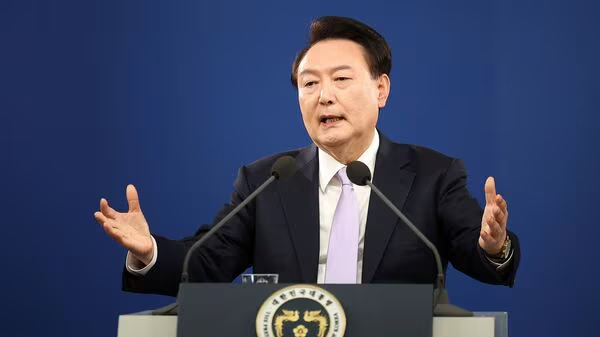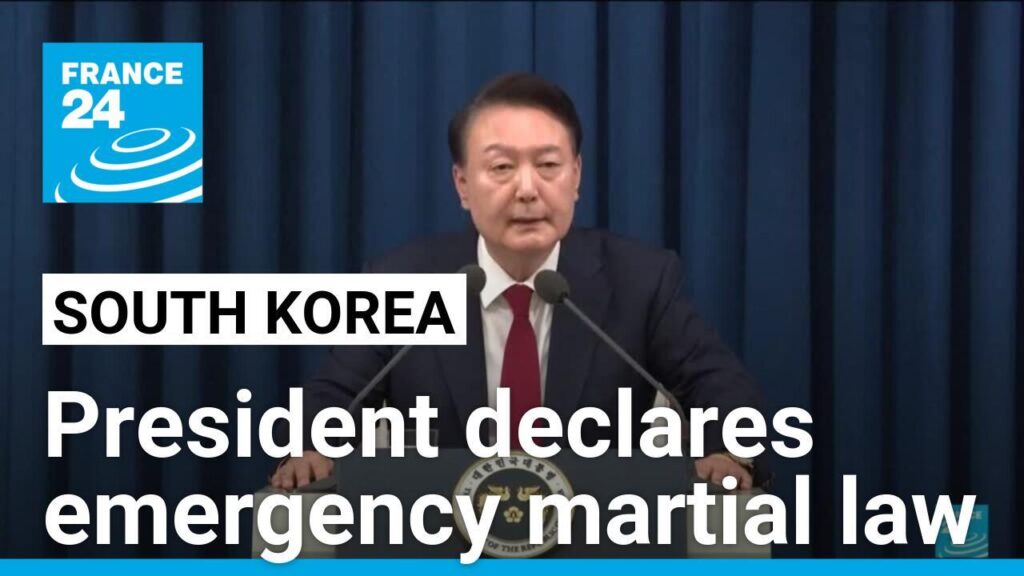On December 3, 2024, South Korea’s President Yoon Suk Yeol shocked the nation by declaring a state of emergency and imposing martial law across the country. This sudden and drastic move stirred fears of a return to authoritarian practices, with many remembering South Korea’s history under military dictatorship. However, within 24 hours, the National Assembly voted to rescind the declaration, signaling strong opposition and resistance to the president’s decision. The entire episode has raised concerns about the state of democracy in South Korea, highlighting the fragile balance between governance, national security, and individual freedoms.
What Led to the Declaration?
President Yoon’s decision to declare martial law came amid growing political unrest and escalating tensions between the government and opposition parties. Although details about the exact reasons behind this emergency declaration are still unclear, sources suggest that the move was in response to significant political pressures. Critics of President Yoon argue that the martial law declaration was politically motivated, a tactic to suppress opposition voices, especially in light of ongoing investigations into government officials.
The country had already been witnessing growing dissatisfaction with the president’s administration, particularly over issues related to corruption and handling of economic policies. By the end of 2024, South Korea’s political landscape had become more polarized, and public demonstrations had become increasingly frequent. The declaration of martial law was seen by many as a desperate attempt to quell dissent and assert control over a fractious political environment.
The Immediate Reaction
As news of the martial law declaration spread, it sparked immediate protests and backlash from a broad spectrum of South Korean society. Citizens took to the streets in Seoul and other major cities, fearing that the emergency measure would limit civil liberties and suppress their rights to protest and assemble. Protesters included students, activists, and even ordinary citizens who saw the move as an overreach by the president, reminiscent of South Korea’s authoritarian past under military rule.
The public’s fear was justified, as martial law typically grants the government sweeping powers to restrict freedom of assembly, curtail media activities, and control public discourse. In South Korea, the last declaration of martial law occurred in 1980, when the country was under a military dictatorship. The Gwangju Uprising, which occurred during that time, remains a painful memory for many South Koreans, and it became a symbol of the nation’s struggle for democracy. Thus, any reference to martial law immediately raises concerns about a regression to undemocratic practices.
A Quick Reversal
Despite the initial shock and fears, the situation took a dramatic turn when the South Korean National Assembly, largely consisting of opposition lawmakers, voted to rescind the martial law declaration. The vote came after a tense standoff in the parliament building, where security forces attempted to block lawmakers from entering the session. The opposition parties, along with civil society organizations, vehemently opposed the measure, calling it an abuse of power.
The swift reversal was a testament to the strength of South Korea’s democratic institutions and the checks and balances that exist within the political system. It was also an indication of the widespread opposition to President Yoon’s actions. The National Assembly’s rejection of the emergency measures signaled that South Koreans would not tolerate a rollback of their democratic rights.
International Concerns
Internationally, the martial law declaration drew sharp criticism. Human rights organizations, including Amnesty International and Human Rights Watch, expressed concern over the impact such a move would have on South Korea’s reputation as a democratic nation. Both groups condemned the imposition of martial law, warning that it could set a dangerous precedent for other countries in the region.
In addition to concerns over human rights, the move drew reactions from neighboring countries, especially North Korea. The declaration of martial law in South Korea came at a time of heightened tensions with North Korea, which had been involved in escalating military provocations and cyberattacks in recent months. South Korean officials have been increasingly concerned about North Korea’s intentions, which may have influenced the government’s decision to take extreme measures to secure the country.
The Political Fallout
The immediate political fallout from the martial law declaration has been significant. Many political analysts have suggested that President Yoon’s approval ratings, already low due to a series of controversial decisions, would likely take another hit. Opposition parties have called for the president’s impeachment, arguing that he exceeded his constitutional authority by taking such an extreme step.
In response to the growing crisis, President Yoon has attempted to stabilize the situation by reshuffling his cabinet. He nominated a new defense minister to replace the one who resigned following the controversy surrounding the martial law order. Despite these efforts, however, the damage to his administration may be long-lasting. The president’s ability to lead effectively will likely be challenged, particularly if the public continues to view his actions as heavy-handed.
The Legacy of Martial Law in South Korea
South Korea has a long history of struggling for democracy. The country spent much of the 20th century under authoritarian regimes that used martial law and other repressive measures to maintain control. The legacy of these regimes is still felt today, with many South Koreans remaining deeply suspicious of any move to limit democratic freedoms.
The 1980 Gwangju Uprising, where military forces killed hundreds of pro-democracy protesters, remains a painful chapter in the country’s history. The event was a catalyst for South Korea’s eventual transition to democracy in the late 1980s. As a result, South Koreans are particularly sensitive to the use of martial law and any attempt to restrict civil liberties.
Given this context, President Yoon’s decision to declare martial law raised alarm bells across the country. Although the declaration was rescinded quickly, it highlighted the tensions that continue to simmer beneath the surface of South Korean politics. It also served as a reminder of how fragile democracy can be, even in countries that have undergone significant political transformation.
Conclusion
The declaration of martial law in South Korea in December 2024 marked a significant moment in the country’s political history. The National Assembly swiftly reversed the decision, reflecting the deep political divisions and the challenges President Yoon’s administration faces. The controversy surrounding the martial law declaration has sparked debates about the future of democracy in South Korea and the role of the military in civilian governance.
South Korea’s democracy has come a long way since the days of military dictatorship, but the events of December 2024 serve as a reminder that the fight for democratic freedoms is ongoing. Whether or not President Yoon can regain the public’s trust remains uncertain, but the swift and resounding rejection of martial law suggests that the South Korean people will continue to defend their hard-earned democratic rights.Ground News.


